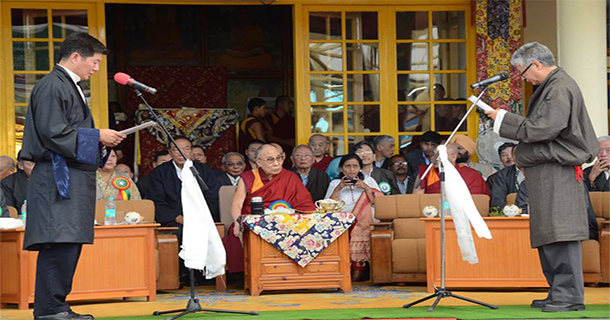
Dr Lobsang Sangay is sworn in by Chief Justice Commissioner, Kargyu Dhondup Photo: Tenzin Samten/Contact
Dr Lobsang Sangay has been sworn-in as prime minister, or Sikyong, of the Tibetan Government-in-Exile, in the presence of honoured guest His Holiness the Dalai Lama, and in front of 6000 emotional onlookers.
The function was held at Tsuglagkhang, the main Buddhist temple of Dharamasala and the home of His Holiness. Crimson-swathed monks, nuns, and lay people in traditional dress arrived hours before it was due to start to secure a place in the audience. Huge Tibetan flags adorned the walls and His Holiness, Sikyong and all members of parliament were welcomed to the stage with the country’s national anthem.
It is Dr Sangay’s second term in office; the second time too that a prime minister has been democratically elected by Tibetan exiles. Despite resistance from the community, the Dalai Lama relinquished all political authority in 2011, citing his belief that in the long run, democracy would be beneficial. Lobsang Sangay beat his main rival, Speaker Penpa Tsering by almost 10,000 votes, with 59,000 ballots cast by Tibetans all over the world.
The swearing in was administered by chief justice commissioner Mr Kargyu Dhondup and marks the official commencement of Dr Sangay’s government. He will hold his post for five years and on signing the oath, was greeted with tumultuous applause. Outgoing members of parliament ended their time in office by offering His Holiness and Sikyong white scarves symbolising luck and prosperity. All incoming members were also present on the stage, as well as officials from the Central Tibetan Administration and senior monks and nuns.
Both Sikyong and His Holiness The Dalai Lama delivered impassioned speeches. Dr Sangay stressed the continuation of ‘The Middle Way Policy,’ calling for genuine autonomy from China as opposed to independence and assuring Tibetans that fresh attempts would be made to make contact with the superpower. Official talks ceased in 2010.
Responding to the Dalai Lama’s advice to hope for the best but prepare for the worst, Sikyong has called his approach, ‘the strategy of five-fifty.’ “In the next five years it is clear that we must put maximum efforts into achieving genuine autonomy for all Tibetans … however, in case we have to continue our struggle for many years, we need to strategise in order to strengthen and sustain our cause for the next 50,” he announced. “We have to protect and preserve our unique identity and tradition. We need to build self-reliance, both in education and economy.”
His Holiness also called on Tibetans to guard their culture, particularly its scripts and linguistic traditions. “The Tibetan language is the only language where the pure essence of the Nalanda tradition is preserved. Therefore, it is extremely important to study and preserve it,” he stated. “Over the years I have met numerous people including scholars, scientists, politicians, and spiritual leaders and I have come to realise that the ways of Tibetan Buddhism is among the best, primarily because it is based on scientific analysis and logical study.”
Both men talked of the country’s freedom struggle, Sikyong focusing on the “supreme sacrifices” people have made in their fight for independence. He vowed that the 144 self-immolations to date would not be in vain, praising the “patriotic fervour that continues to burn in Tibet and all Tibetan hearts.” “The issue of Tibet is not only an issue for the six million Tibetans, but a cause that stands for justice and peace,” he proclaimed.
His Holiness emphasised that the most important aspect of the movement should be to help those who still live under Chinese rule, and that although the fight for autonomy will continue, the principle of non-violence must be adhered to.
Education was deemed to be the answer for both men. “It is the key to our freedom struggle,” declared Dr Sangay, while the Dalai Lama stressed that moral as well as intellectual instruction is essential. “Despite the great heights that modern education has reached, it is still inadequate when it comes to inner values,” he said. “It is obvious when you see that most criminals are quite advanced in modern education. Moreover, the prevalence of social ills like corruption and dishonesty are a result from the lack of moral principle.”
The ceremony ended with a traditional Tibetan dance and further congratulations from Sikyong’s supporters. The success of this second election demonstrates how the seeds of democracy, sewn by His Holiness, are flourishing in the Tibetan exile community.





 Print
Print Email
Email